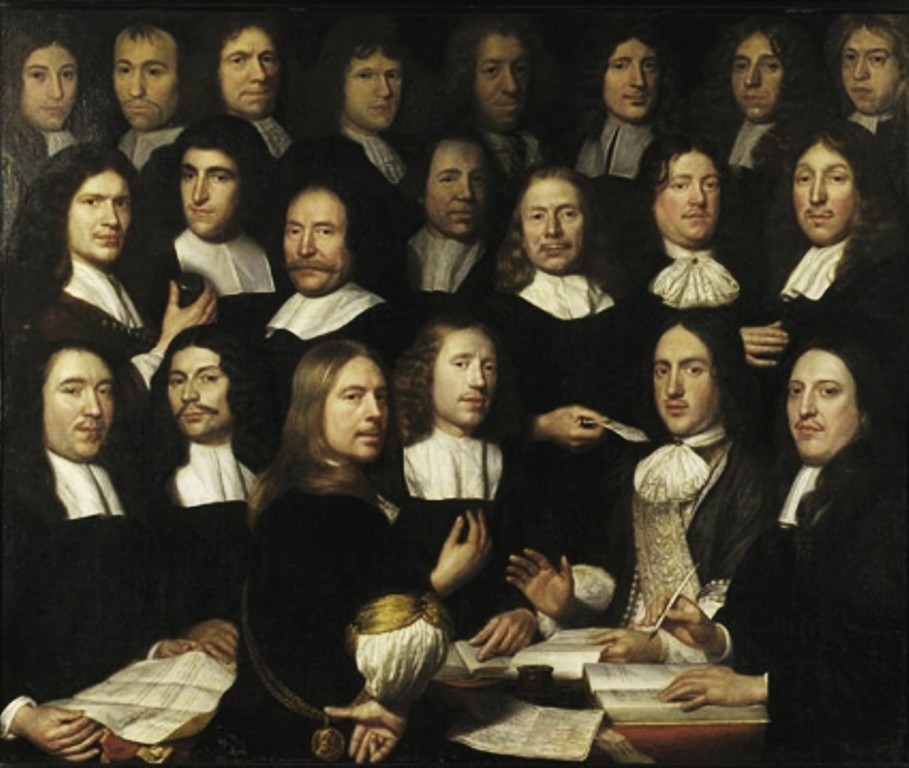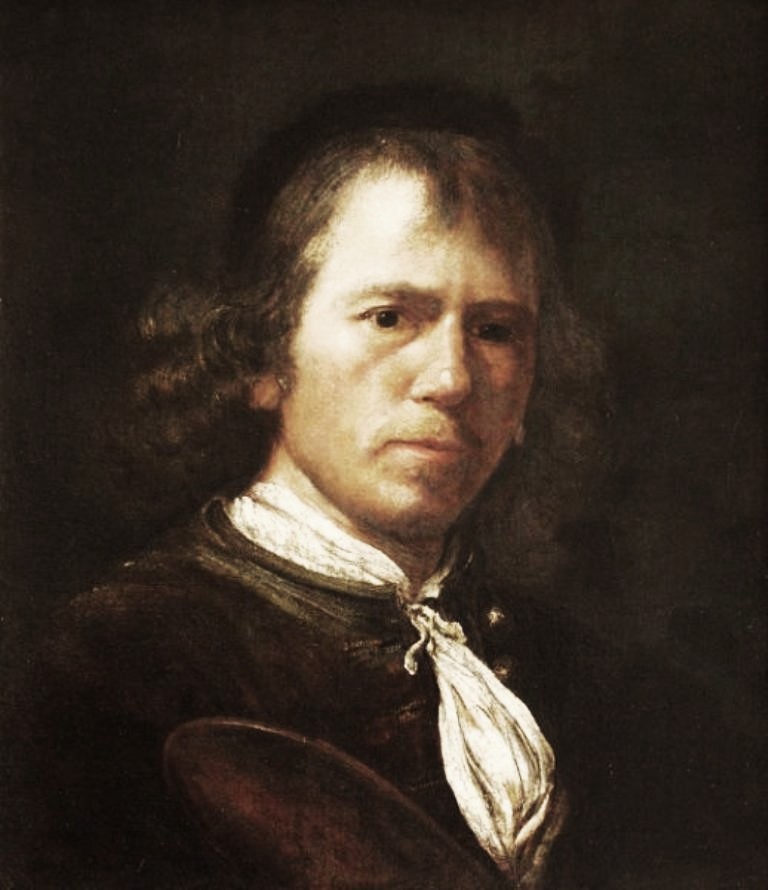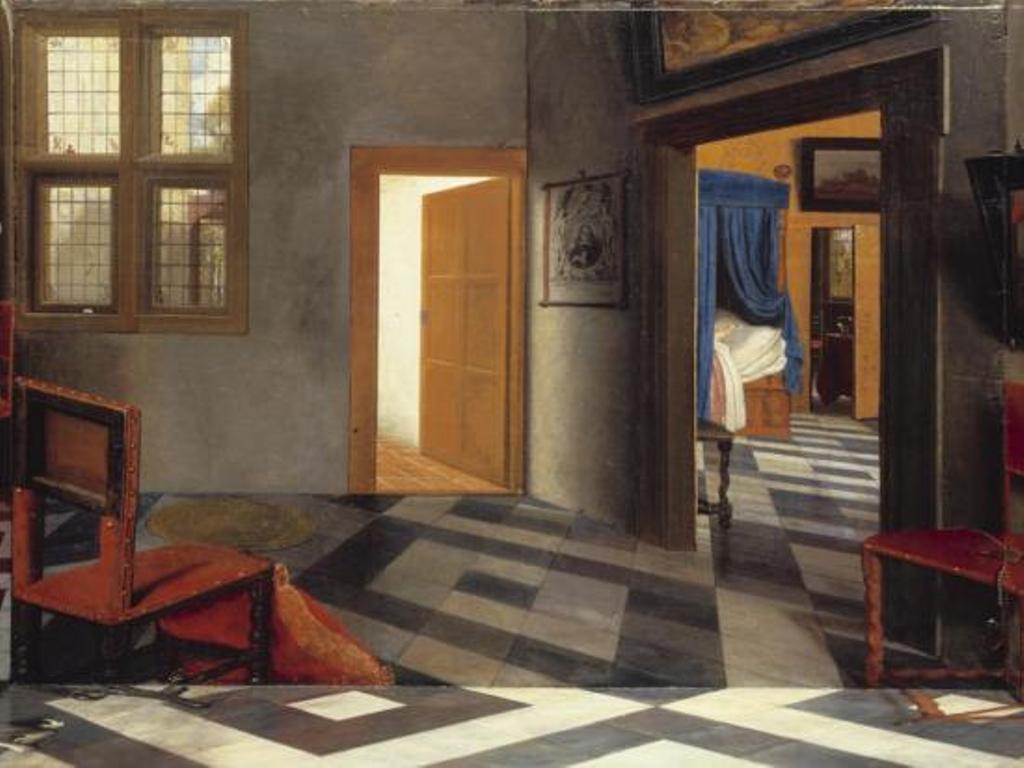- Written by L.C.Geerts
- font size decrease font size increase font size
Famous Dutch Painters from Dordrecht, Ancient Capital of Holland
Part 10
21. Samuel van Hoogstraten

Note : Please do not email me with technical questions about paintings and their age and origin because I am not an expert but I only have gathered information about the Painters from the Netherlands and specially from Dordrecht.
Dordrecht is not only known as the oldest city and ancient capital of Holland but also for the many famous painters who were born or lived in Dordrecht during the late Middle ages and later centuries.
On the next pages you can find many works from these famous painters who were responsible for many styles of paintings and they immortalized the daily life and landscapes in the 15th to 19th century. Most of their masterpieces are nowadays part of collections in museums all over the world and of which many can be seen in the local Dordrechts Museum.
Samuel van Hoogstraten
Dordrecht 1627 - Dordrecht 1678
Samuel van Hoogstraten was born in Dordrecht on 2 August 1627. He was first the pupil of his father, then, some time after his father's death in 1640, he entered Rembrandt's studio, where a fellow pupil was Carel Fabritius. The two young painters probably influenced each other: certainly both showed great interest in geometrical perspective, and Hoogstraten constructed peep-shows with tromp l'oeil scenes inside. Hoogstraten traveled widely, visiting Rome and Vienna, where he was patronized by the Emperor. He was in London in 1666, at the time of the Great Fire. He finally settled in his native town where he was made a Provost of the Mint. His major contribution to art was a book, published in 1678 "lnleyding tot de Hooge Schoole der Schilderkonst" (an introduction to the art of painting) and one of the few handbooks on painting published in Holland in that century. He died in Dordrecht on 19 October 1678.
Dutch painter and writer on art. He painted genre scenes in the style of de Hooch and Metsu, and portraits. but he is best known as a specialist in perspective effects. One of his "perspective boxes" which shows a panted toy world through a peep-hole, is in the National Gallery, London. Only in his early works can it be detected that he was a pupil of Rembrandt.
He traveled all over Europe exhibiting his trompe l'oeil-based peepshow boxes. Samuel Van Hoogstraaten was a student of Rembrandt and studied the writings of Da Vinci. He attended a Dutch school of Trompe l'Oeil which is also a term that means 'deceptive trickery', to 'fool one's eye' and to 'deceive the sight'.
Museums in The Netherlands
The holy family in an interior
Samuel van Hoogstraten
Ink on paper 16,2 x 13,2 cm
Dordrechts museum
A home performance of the Holy family, not as usual, with Jesus as a baby to Mary, but as toddler in intimate embrace with Joseph. Hoogstratens drawing may have Rembrandt's eyes, but the scene is certainly not following the master, rather a translation of Rembrandt's original form language and thought.
Portrait of Mattheus van den Broucke, (1620-1685)
Samuel van Hoogstraten, 1676
Oil on canvas 89 x 71,3 cm
Dordrechts museum
Matthew van den Broucke made career as governor of the VOC. In 1677, a year after his townsman Van Hoogstraten painted this portrait of him he became Mayor of Dordrecht. Van den Broucke had himself portrayed in his role as regent and Board of Indie for the VOC. His left arm rests on a globe, just above the area of the Dutch colonies in Indie. Left behind the curtain Dordrecht is seen, with the Grote Kerk and the port where ships just arrive in the harbors.
Portrait of Johan Cornelisz Vijgeboom and His Wife
Samuel van Hoogstraten, 1647
Oil on canvas, 102 x 130 cm
Dordrechts museum
Portrait of Johan van Cornelisz. Vijgeboom and his wife Anneke Joosten Boogaart in the garden of their Country house in Dubbeldam.
Trompe l'oeil- still-life
Samuel van Hoogstraten, 1664
Oil on canvas 45,5 x 57,5 cm
Dordrechts Museum
In August 1651 Van Hoogstraten received at the Viennese court of Emperor Ferdinand III a gold medal. He received it in honor for a trompe-ll'oeil painting or trickery of the eyes (bedriegertje). Soon van Hoogstraten made a whole series of such fraudulent real paintings, with objects in a letterbox. The personal significance of the objects were still a kind of self-portraits. In this painting we see left the imperial medal on a gold chain. Writing, a leather journal with the year 1664 and a book in marbled paper rolled indicate Hoogstraten's literary activities. The antique cameo and the big ridge of turtle suggest wealth, honor and social standing.
Mint Masters of the Mint of Holland in Dordrecht
Samuel van Hoogstraten,1657
Oil on canvas 137,8 x 165 cm
Dordrechts museum
Dordrecht was already in the thirteenth century, the fixed currency city of Holland. The officers of the Mint had inherited functions as "waardijn" (Mint-master) who belonged to the upper-class of the city. In 1656 Samuel van Hoogstraten came to the Mint. As a newcomer he places himself on the back row on the far right. On the table is a note with the names of the portrayed. The main figure in the middle of the table is the "waardijn" Adriaan van Blyenburgh. Compared with the Nightwatch by Rembrandt in 1642 this group portrait looks as old-fashioned. Van Hoogstraten, even as Rembrandt did, made a good likeness of the portrayed.
Mint Masters of the Mint of Holland in Dordrecht
Samuel van Hoogstraten, 1674
Oil on canvas 139,5 x 165,5 cm
Dordrechts museum
In his second group portrait of the Mint Masters placed Van Hoogstraten himself in front. He took a confident attitude to decompose to Renaissance portraits, with an elbow stabbing out of the picture. Van Hoogstraten, wares the Golden medal he received from of Emperor Ferdinand III. The portrayed are placed more in the center than in the portrait from 1657. Later, van Hoogstraten added new members on the top row. The three heads at the top left are painted by the young Anthony Vreem (1660-1681). His contribution is of meager quality therefore he was payed only eight guilders per portrait, instead of the ten dollars that Van Hoogstraten received.
Adoration of The Child
Samuel van Hoogstraten, 1647
Oil on canvas 57,5 x 70,5 cm
Dordrechts Museum
A group of shepherds - men and women - worship the Christ Child in the crib. At the right Mary in the background lookinh to Joseph. In this early work by Samuel van Hoogstraten we see clearly clearly the influence of his teacher Rembrandt (1606-1669). Rembrandt had a few years earlier painted the Holy family himself, simply with homely atmosphere. The wood fire and the descending Angels are also present on that painting. Samuel van Hoogstraten would shortly after 1650 radically change his style. With this painting he created one of the most intimate scenes from his total oeuvre.
Inside the Westminster Abbey London
Samuel van Hoogstraten, 1663-68
Oil on canvas 156 x 110 cm
Dordrechts Museum
From 1662 to 1667 Samuel van Hoogstraten worled in London for his English clients, he painted mainly portraits and architectural pieces. In this painting, both genres are combined, A man and a woman posing in a church. The artist wanted the attention of the spectator not only be given to the couple. He also showed some highlights of his ingenuity as a perspective painter. With a refined design, the eye of the spectator through a series of progressively by-look and details. Behind the rich dressed pair is the text "Blessed are the merciful" to read, a reference to Christian charity.
Bird still-life wit cat
Samuel van Hoogstraten, 1669
Oil on canvas 76,4 x 64,5 cm
Dordrechts museum
As art theoriticus Van Hoogstraten turned himself in his writings against Still-lifes. In his classical training he protested particularly against lifeless animals and things, he called this style of painting the lowest step in art. He was opposed to an illogical arrangement of objects, such as a slimy haddock in combination with a velvety fudge. Possibly this painting contains a humorous comment on the still life with dead animals, the dead rooster in a beautifully draped dress is exhibited, as food for the cat.
Interior with lady and a dog
Samuel van Hoogstraten, 1678
Oil on canvas 55,4 x 47,2 cm
Dordrechts museum
Genre pieces are paintings of scenes from everyday life, ranging from chic to pub scenes and scenes of Jan Steen household. Van Hoogstraten painted around 1670 a number of small-size interiors with richly dressed figures. The careful presentation of the clothing and the color were used by the wishes of the public in the second half of the seventeenth century. The look at the other house was a typical tradition in Dordtse seventeenth-century painting. It can also be found by the native painters Nicolaes Maes and Cornelis Bisschop.
The Anaemic Lady
Samuel van Hoogstraten, 1660s
Oil on canvas, 70 x 55 cm
Rijksmuseum, Amsterdam
Mattheus van den Broucke (1620-85)
Samuel van Hoogstraten, c. 1670/78
Oil on canvas 142 x 111 cm
Rijksmuseum Amsterdam
Portrait of Mattheus van den Broucke (1620-85), Governor of the Indies, with the gold chain and medal presented to him by the VOC (Dutch East India Company) in 1670.
Madonna and child with St Anne
Samuel van Hoogstraten, 1630
Oil on panel 71,2 x 55,2 cm
Rijksmuseum Amsterdam
Portrait of a painter
Samuel van Hoogstraten, c. 1660
Oil on canvas 43 x 37 cm
Bredius Museum The Hague
Formerly also thought to be a self-portrait, but the model looks nothing like the one next, nor is it similar in style and technique.
Most probably this portrait is Aelbert Cuyp aged about 40.
Self portrait with turban
Samuel van Hoogstraten, 1644
Oil on panel 63 x 48 cm
Bredius Museum The Hague
Van Hoogstraeten has dressed himself up with turban, pearls and fur collar to make himself look exotic. He must have painted it while still a pupil of Rembrandt, as other Rembrandt-pupils did the same.
Museums in the United Kingdom
A Peepshow with Views of the Interior of a Dutch House
Samuel van Hoogstraten, 1655-60
Oil and egg tempera on wood 58 x 88 x 63.5 cm
National Gallery London
Signed on a letter on the floor of the box, A Monsieur/Mon(s) S. Hoogstraten/a/ dordrecht
A superb Hoogstraaten perspective box c. 1660. Two individual views from individual peepholes provided this 3-dimensional view of a contemporary Dutch home. Five walls of the interior 'box' are painted with interior scenes of perspective while the front wall is left open for light. Light once again comes into our story as it is this very light from the open side that plays against the perspective artwork of Hoogstraaten.
The peepshow is a rectangular box, the interior is painted on three sides, as well as on the top and bottom. The sixth side is open; originally light would have entered the box from this side, perhaps through specially treated paper stretched across it. The box would have been placed close to a window or illumination provided by a candle. There are peep-holes in the two shorter sides which provide the illusion of three-dimensional views of the interior of a house. Hoogstraten's box is an unusually elaborate example, decorated on the exterior with allegorical paintings which correspond to chapters in a theoretical book that the artist was to write later. The long side illustrates love of wealth as a motivation for the artist, who appears with a putto holding a cornucopia. Love of art and of fame are the subjects of the paintings on the short sides, while the top is decorated with an allegory of physical love, representing Venus and Cupid in bed, painted in anamorphic (distorted perspective) projection.
The box was painted in Dordrecht in the late 1650s. A number of such peepshows were made in Holland but only a few examples have survived.
A Peepshow with Views of the Interior of a Dutch House
Samuel van Hoogstraten, 1655-60
Oil and egg tempera on wood 58 x 88 x 63.5 cm
National Gallery London
Signed on a letter on the floor of the box, A Monsieur/Mon(s) S. Hoogstraten/a/ dordrecht
This box is one of the finest survived.
Sir Thomas Knatchbull (died 1703) Recorder of Maidstone
Samuel van Hoogstraeten, 1667
Watercolour 32,7 x 24,1 cm
National Portrait Gallery London
A young man reaching for his cap
Samuel van Hoogstraten, 1630
City Galleries, Manchester
Other museums of Europe
Self-Portrait
Samuel van Hoogstraten
Oil on canvas 63 x 48 cm
The Hermitage, St. Petersbug
Trompe l'oeil- Still-life
Samuel van Hoogstraten, 1666-68
Oil on canvas, 63 x 79 cm
Staatliche Kunsthalle, Karlsruhe
Court of the Hofburg, Vienna
Samuel van Hoogstraten, 1652
Oil on canvas 79 x 49,5 cm
Kunsthistorisches Museum Wien
Old man looking through the window
Samuel van Hoogstraten, 1653
111 x 86,5 cm
Kunsthistorisches Museum Wien
View of a Corridor
Samuel van Hoogstraten, c. 1670
Oil on canvas, 260 x 140 cm
Musée du Louvre, Paris
Interior view, or The Slippers
Samuel van Hoogstraten, 1658
Oil on panels 103 x 70 cm
Musée du Louvre, Paris
From 1839-42 to 1877-83, this painting bore Pietsser de Hooch's monogram with the not unlikely date of 1658. Contemporary with the early work of de Hooch and Vermeer, it was formerly attributed to each but is quite distinct from the latter's experiments. Alluding - as does the Ter Borch-inspired picture in the background - to the vain and gallant pastimes of the absent mistress of the house, this is a subtly moralistic piece, a fascinating exercise in perspective, and a painting of poetic calm.
 |
 |
Museums in the USA
Two Women by a Cradle
Samuel van Hoogstraten, 1670
Oil on canvas, 66 x 55 cm
Museum of Fine Arts, Springfield USA
The Detroit box
Samuel van Hoogstraten, 1654-1662
Oil paint glass mirror and walnut 42.0 x 30.3 x 28.2 cm
The Detroit Institute of Arts, Detroit USA
The Detroit box is one of only six extant perspective boxes. This type of boxes were made in Dordrecht, Holland during a twenty-five year period beginning about 1650. The images incorporate several themes characteristic for Dutch paintings in the late 17th century and portrays interiors of wealthy Dutch houses architectural views, and symbols of the vanity of earthly pleasures.
Resurrection of Christ
Samuel van Hoogstraten, c. 1650
Oil on canvas 81 x 64.9 cm
The Arts Institute of Chicago
Woman at a Dutch door
Samuel van Hoogstraten
Oil on canvas, 12.5 x 18 cm
The Art Institute, Chicago
The Annunciation of the Death of the Virgin
Samuel van Hoogstraten, c. 1670
Oil on canvas 66 x 52.7 cm
Metropolitan Museum of Art, New York
Private collections
Portrait of a lady
Samuel van Hoogstraten
Oil on panel 40.8 x 30.8 cm
Private collection
Portrayed half-length, in a red and white dress, a dark red wrap and pearl earrings, a letter in her left hand, leaning on a stone ledge.
Youth reading on stairs beneath a landing, a dog in the background
Samuel van Hoogstraten
Oil on canvas 238 x 171 cm
Private collection
Mother with a Child in a Wicker Cradle
Samuel van Hoogstraten
Oil on canvas, 58 x 48 cm
Private collection
A Portrait of Count Ferdinand von Werdenberg
Samuel van Hoogstraten, 1652
Oil on canvas 192.4 x 134.6 cm
Private collection
Portrayed standing full-length, stepping from a Staircase with a Brittany Spaniel. The painting is signed, dated and inscribed with the Hapsburg Coat of Arms.
A young boy preparing to bath in a stream, watched by a girl
Samuel van Hoogstraten
Oil on Canvas 95.5 x 75.5 cm
Private collection
A gipsy telling the fortune of a young couple under an arcade
Samuel van Hoogstraten
Oil on canvas 68.3 x 55 cm
Private collection
She seated small full length, wearing a white silk dress with yellow wrap, he leaning over a balustrade, wearing a light brown mantle, a Country house in a garden beyond.
Portrait of a young man
Samuel van Hoogstraten
Oil on canvas 52.2 x 44.2 cm
Private collection
Portrayed bust-length, in a brocade-lined cloak and a velvet black cap.












































